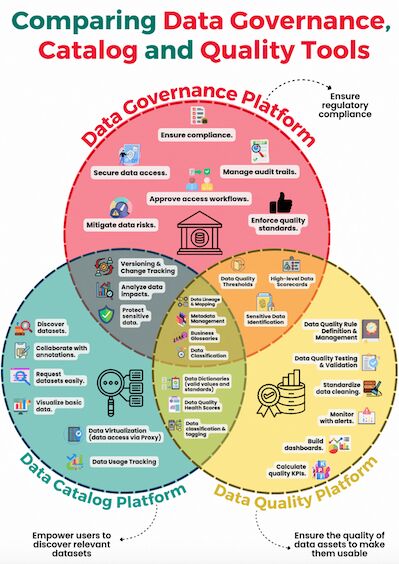Data Governance vs. Data Catalog vs. Data Quality
Quote from bsdinsight on 6 April 2025, 09:36🚀 Data Governance vs. Data Catalog vs. Data Quality: Understanding the Differences & Why You Need All Three
In today’s data-driven world, organizations rely on three key pillars to manage and maximize the value of their data: Data Governance, Data Catalog, and Data Quality. While these platforms may seem similar, they serve distinct and complementary roles. Here’s a breakdown:
📊 1. Data Governance Platform
Purpose: Establishes policies, standards, and processes to ensure data is used responsibly, securely, and in compliance with regulations (e.g., GDPR, CCPA).
✅ Key Focus:
Data ownership and accountability
Access control and security
Regulatory compliance and audit trails
Data lifecycle management
🔎 Example Tools: Collibra, Informatica Axon, Alation
💡 Why It Matters: Data governance ensures data integrity, consistency, and compliance—building trust and reducing regulatory risks.📚 2. Data Catalog Platform
Purpose: Provides a searchable inventory of data assets across the organization, enabling users to discover, understand, and access data easily.
✅ Key Focus:
Metadata management and lineage tracking
Data discovery and classification
Business glossary and data context
Data democratization
🔎 Example Tools: Alation, Atlan, Microsoft Purview
💡 Why It Matters: Data catalogs bridge the gap between technical and business users, enabling faster insights by making data more accessible and understandable.📈 3. Data Quality Platform
Purpose: Ensures data is accurate, consistent, complete, and reliable for analytical and operational use.
✅ Key Focus:
Data validation and profiling
Anomaly detection and error correction
Monitoring and alerting for quality issues
Automated data cleansing
🔎 Example Tools: Talend, Informatica Data Quality, Monte Carlo
💡 Why It Matters: Poor data quality leads to bad decisions. A strong data quality framework ensures trustworthy analytics and operational efficiency.📌 The Big Picture:
A Data Governance platform sets the rules, a Data Catalog helps you find and understand data, and a Data Quality platform ensures your data is reliable. Together, they drive better decision-making, operational efficiency, and regulatory compliance.
🚀 Data Governance vs. Data Catalog vs. Data Quality: Understanding the Differences & Why You Need All Three
In today’s data-driven world, organizations rely on three key pillars to manage and maximize the value of their data: Data Governance, Data Catalog, and Data Quality. While these platforms may seem similar, they serve distinct and complementary roles. Here’s a breakdown:
📊 1. Data Governance Platform
Purpose: Establishes policies, standards, and processes to ensure data is used responsibly, securely, and in compliance with regulations (e.g., GDPR, CCPA).
✅ Key Focus:
Data ownership and accountability
Access control and security
Regulatory compliance and audit trails
Data lifecycle management
🔎 Example Tools: Collibra, Informatica Axon, Alation
💡 Why It Matters: Data governance ensures data integrity, consistency, and compliance—building trust and reducing regulatory risks.
📚 2. Data Catalog Platform
Purpose: Provides a searchable inventory of data assets across the organization, enabling users to discover, understand, and access data easily.
✅ Key Focus:
Metadata management and lineage tracking
Data discovery and classification
Business glossary and data context
Data democratization
🔎 Example Tools: Alation, Atlan, Microsoft Purview
💡 Why It Matters: Data catalogs bridge the gap between technical and business users, enabling faster insights by making data more accessible and understandable.
📈 3. Data Quality Platform
Purpose: Ensures data is accurate, consistent, complete, and reliable for analytical and operational use.
✅ Key Focus:
Data validation and profiling
Anomaly detection and error correction
Monitoring and alerting for quality issues
Automated data cleansing
🔎 Example Tools: Talend, Informatica Data Quality, Monte Carlo
💡 Why It Matters: Poor data quality leads to bad decisions. A strong data quality framework ensures trustworthy analytics and operational efficiency.
📌 The Big Picture:
A Data Governance platform sets the rules, a Data Catalog helps you find and understand data, and a Data Quality platform ensures your data is reliable. Together, they drive better decision-making, operational efficiency, and regulatory compliance.


